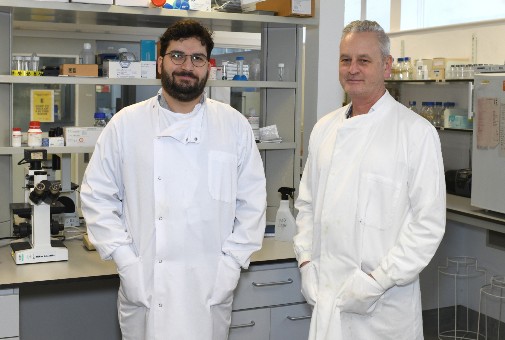A University of York spin-out company aims to produce a novel treatment created from engineered human stem cells in the fight against arthritic disease in both adults and children.
 Dr David Kuntin (left) and Professor Paul Genever, co-founders of the new company
Dr David Kuntin (left) and Professor Paul Genever, co-founders of the new company
Rheumatoid arthritis impacts just under half a million adults and children in the UK, causing joint pain and inflammation of the hands, knees, elbows, ankles, and/or wrists. It is categorised as an autoimmune disease, which means that instead of fighting germs and viruses, the body's immune system attacks its own body cells.
Current therapies for the disease involve easing pain and inflammation, but they lack the combined actions of reducing inflammation and protecting the tissue from further damage.
The new company, called Mesenbio, will address this issue with a new treatment based on nano-sized 'messengers' created from engineered human stem cells that not only curb inflammation but can kick-start the process of regenerating damaged tissue.
Laboratory tests
Professor Paul Genever, from the University of York's Biomedical Research Institute and Co-Founder of Mesenbio, said: "We have been developing this method of treatment for a decade now, with support from Versus Arthritis, and it has proved successful in laboratory tests, but this new company will allow us to move toward human clinical trials.
"Our research has focused on extracellular vesicles or EVs, which are nano-sized structures released from cells that have therapeutic properties. We have been able to engineer these structures from human stem-cells to target its anti-inflammatory and tissue-regeneration capabilities, which is what you need to treat arthritis - the ability to take away the pain but also repair the damage."
Treatment
Current uses of EVs relies on donor cells, but their effectiveness as a treatment can vary from patient-to-patient. Engineering human stem cells allows scientists to enhance the characteristics of EVs that are most significant to arthritis treatment and produce them at scale in the laboratory.
Dr David Kuntin, from the University of York and CEO of Mesenbio, said: "This method and its scalability makes it much more likely we can create a drug that can be administered via injection that can not only halt the damage to tissue, but repair and reduce the immune system overreaction.
"We know this works in a laboratory setting and our new company will allow us to get to human trials in a reasonable timescale, so that we can look to the future of what this new therapeutic might mean for clinicians and crucially patients of this debilitating condition."
Developmental stage
Mesenbio is supported by £1.4 million funding from Innovate UK and investors including DSW Ventures and NG Bio.
Jason Goldstein, co-founder at NG Bio, said: "This is an exciting time in the search for therapies that can address tissue damage resulting from arthritic conditions. Mesenbio's technology is uniquely placed to address this problem and we look forward to supporting this talented team on the next step in their journey."
Lucy Donaldson, Director for Research and Health Intelligence at the charity Versus Arthritis, said: "We are pleased to support Mesenbio as they move into the next developmental stage for important and necessary arthritis treatment, and will continue to fund research that aims to develop - and provide access to - the treatment people with arthritis need, with real hope of a cure in future."






